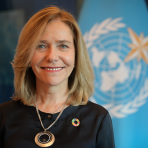Opening remarks on the occasion of the World Meteorological Day 2025
Excellencies, distinguished guests and colleagues,
I am delighted to welcome you here today. Happy World Meteorological Day. Happy 75th Anniversary of the World Meteorological Organization as the UN’s voice on weather, climate and water.
Today – and for the whole year – we celebrate the contribution of WMO and its Members to saving lives, serving society and protecting our planet.
WMO is often referred to as the UN Weather Agency. But we are more than weather forecasters. Much, much more. WMO makes the world safer, more secure, and prosperous. WMO is a platform for free exchange of data, products, and services between National Meteorological and Hydrological Services and users. These are critical to national and international security.
WMO information is a lifeline for climate sensitive sectors. For example - agriculture, transport, energy, water management and health. The WMO community brings billions of dollars in added value to the global economy. We save billions more in averted losses.
Over the years, we have saved hundreds of thousands of lives. And we will continue to do so. It is our top, overriding priority.
Three years ago, on World Meteorological Day, UN Secretary-General António Guterres launched the Early Warnings for All Initiative. It seeks to ensure that everyone, everywhere is covered by early warning systems by the end of 2027.
WMO, the UN Office for Disaster Risk Reduction, the International Telecommunications Union and the International Federation of Red Cross and Red Crescent Societies are spearheading this initiative. We are actively reaching out to embrace additional partners.
We are now at the half-way point. We are proud of our progress.
One hundred and eight countries now report having some capacity for multi-hazard early warning systems. This is more than double the number in 2015.
Let me make it clear, national ownership and community involvement are key to success.
But far too many people remain unprotected. Many of them in Least Developed Countries and Small Island Developing States.
We need to go further, and we need to go faster.
The theme of this year’s World Meteorological Day is therefore “Closing the Early Warning Gap Together”.
To achieve this ambitious goal, we must:
- Innovate together to scale up technologies.
- Stand together to foster collaboration.
- Invest together to create, mobilize, and share resources.
Technological advances and tools like Artifical Intelligence have the potential to revolutionize weather forecasts and early warnings. Let us use them for the global good!
You will hear more about this from our eminent speakers today.
These are challenging times for our global community.
But I must stress that the work of WMO is more important today than at any time in our 75 year old history.
The latest WMO State of the Global Climate Report shows the urgency of the challenge.
- Carbon dioxide levels are at their highest since eight hundred thousand years.
- 2024 was the warmest year on record, with global temperatures about 1.55°C above pre-industrial levels.
- The past ten years were the ten warmest on record.
- Each of the past eight years set a new ocean heat record.
- The 18 lowest Arctic sea ice extents were all in the past 18 years.
- The three lowest Antarctic ice extents were in the past three years.
- The rate of sea level rise has doubled since satellite measurements began.
- Extreme weather worsened displacement, food insecurity and economic upheavals.
We just marked the first ever World Glaciers Day on 21 March, as well as World Water Day on 22 March. Glacier retreat is triggering an avalanche of impacts. On economies, ecosystems and communities, not just in mountain regions but at global level.
The past three years suffered the largest three-year loss of glacier mass on record. Each year, glaciers lost the equivalent of thirty years of water consumption. That is huge.
After this ceremony you are welcome to join us in the WMO Attic for the traditional reception prepared by staff. Enjoy the view of the snow and ice-capped Mont Blanc and the Alps – because our granchildren, perhaps even our children – may not have this privilege.
To conclude, I would like to stress that 2025 is a decisive year for Climate Action, for Sustainable Development and for Early Warnings for All. As we gather today, let us reaffirm our commitment: we must go further, we must go faster, and we must go together.
Statement by


